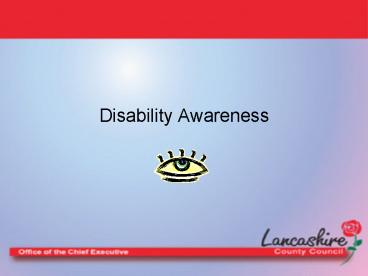Disability Awareness - PowerPoint PPT Presentation
1 / 31
Title:
Disability Awareness
Description:
AUDIO-DESCRIBE VIDEOS. BRAILLE BOOKS. TACTILE BOOKS. LARGE PRINT BOOKS. INFORMATION AND LOTS MORE. ... PART 2 STOCK SELECTION. PART 3 ENQUIRY PROCEDURES/HOW ... – PowerPoint PPT presentation
Number of Views:29
Avg rating:3.0/5.0
Title: Disability Awareness
1
Disability Awareness
2
If we treat everyone as we would like to be
treated ourselves, this world would be a far
happier place to live and work in.
Lancashire County Council
3
Disability Discrimination Act, 1995
- From December 1996
- Not to refuse service.
- Not to provide service of a worse standard or in
a worse manner. - Not to provide service on less favourable terms.
4
Disability Discrimination Act, 1995
- From 1ST October 1999
- reasonable adjustments must be made to
- Change policies, practices and procedures.
- Provide auxiliary aids and services.
- Provide the service by alternative means, if
premises are inaccessible. - From 2004, remove physical barriers or provide
permanent equipment to assist disabled people.
5
Exercise
- Treasure Hunt
6
Basic rules for Better Communication
- Let Your Face be Seen
- Dont Cover Your Mouth
- Speak Slowly and Clearly
- Rephrase or Write Things Down
Lancashire County Council
7
Basic rules for Better Communication
- Be Patient
- Talk Directly to the Person
- Avoid Background Noise
- Introduce Yourself
Lancashire County Council
8
Basic rules for Better Communication
- Dont Be Embarrassed
- Eye level Contact
- Concentrate on What is Being
Said - Use Simple Language
Lancashire County Council
9
Basic rules for Better Communication
- Put Yourself in Their Place
- Treat Like an Adult
- Concentrate on Words, not Looks
Lancashire County Council
10
- Services for Disabled People
11
Services
- There are three main initiatives / services. Most
of these services are available through any
branch library. - Peoples Centres
- Smile Centres
- Access Service
12
People Centres
13
In 2003
As a result of a successful bid for 65,000 to
the Peoples Network Excellence Fund
14
15 Peoples Centres have been developed
15
Morecambe
Lancaster
Thornton
Clitheroe
Poulton
Nelson
Harris
Burnley
St Annes
Accrington
Leyland
Rawtenstall
Ormskirk
Chorley
Skelmersdale
16
Our Aim
- Improve Access to Computers
- Develop Life Skills
- Promote Learning
- Promote Reader Development
- Promote Social Inclusion
17
Possible Barriers
- Learning Difficulties
- Language Barriers
- Visual Impairment
- Physical Disability
- Cultural Barriers
18
Staff
Each Peoples Centre has 2 trained members of
staff
19
Why not look at our Website?
www.people.lancashire.gov.uk
20
Smile Centres
For young people with additional learning needs,
Smile Centres in 15 libraries provide multi-media
collections, adapted computers and activities
Lancashire County Library/DCMS Wolfson Reader
Development Programme
21
SETTING UP OF SMILE
- SCHEME AIMED AT CHILDREN, YOUNG ADULTS WITH
SPECIAL NEEDS AND THE PARENTS, CARERS AND
PROFESSIONALS. - 15 SMILE CENTRES BASED IN LIBRARIES ACROSS
LANCASHIRE.
Lancashire County Library/DCMS Wolfson Reader
Development Programme
22
WHY SMILE
OCIAL INCLUSION
OTIVATION
SMILE
NFORMATION
ITERACY
FFECTIVE PARTNERSHIPS
Lancashire County Library/DCMS Wolfson Reader
Development Programme
23
SMILE CENTRE COLLECTIONS
ALL COLLECTIONS INCLUDE ITEMS FROM
- MAKATON
- BRITISH SIGN LANGUAGE
- AUDIO-DESCRIBE VIDEOS
- BRAILLE BOOKS
- TACTILE BOOKS
- LARGE PRINT BOOKS
- INFORMATION AND LOTS MORE
Lancashire County Library/DCMS Wolfson Reader
Development Programme
24
SMILE STAFF/TRAINING
EACH SMILE CENTRE HAS 2 FULLY TRAINED MEMBERS OF
STAFF
TRAINING PACKAGE 3 FULL DAYS.
PART 1 CUSTOMER CARE PART 2 STOCK
SELECTION PART 3 ENQUIRY PROCEDURES/HOW TO
PROMOTE AND PUBLISE THE SCHEME.
Lancashire County Library/DCMS Wolfson Reader
Development Programme
25
READER/LEARNING DEVELOPMENT SCHEME
- Story times
- Activities and Events for all young people
- Class visits for all schools
- Opportunities for parents to meet other parents
- Information for carers and families
- details of organisations to support young people
who have extra learning needs
Lancashire County Library/DCMS Wolfson Reader
Development Programme
26
Access to Services Group
27
The Role of the ASG
- Is to look at how we can remove the barriers to
using the service, by researching the needs of
the target groups. And sharing best practice
through The Network - an organisation which
promotes social inclusion for libraries, museums
and archives.
28
Aims to
- Achieve social inclusion in libraries
- Identify and resolve practical problems
- Communicate with staff
- Develop guidance for staff
- Target potentially excluded groups
- Promote the service
29
Strategies to achieve social inclusion
- Research
- Consultation
- Partnerships
- Devise action plan
- Provision of materials
- Innovative solutions
- Targeting and promoting
- Effective communication
30
Staff guidance and communication
- Training programmes
- Induction training
- The Loop and divisional newsletters
- The Intranet
- Emails including Power point updates
- DDA information packs
31
Exercise
- Group discussion































